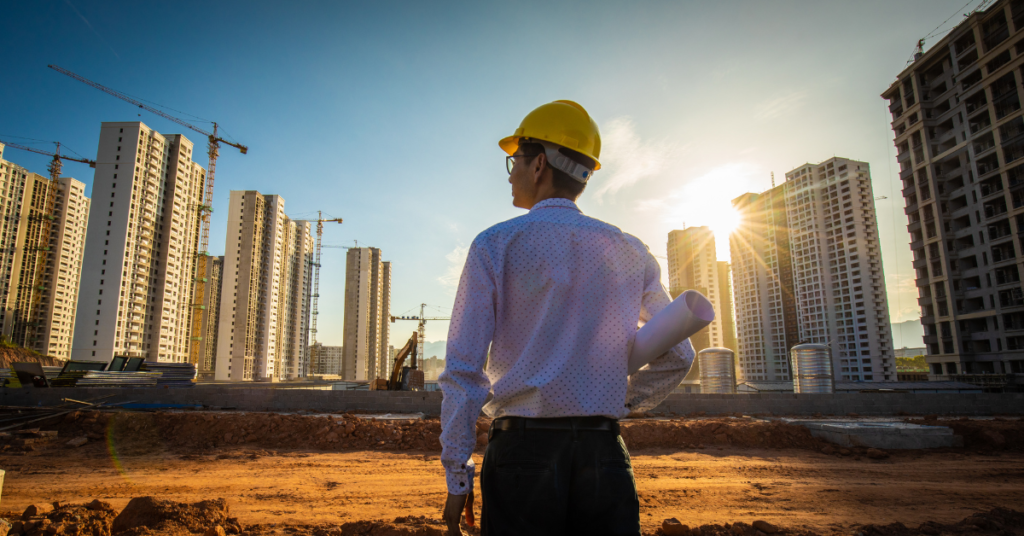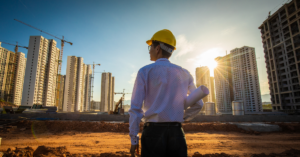UAE’s construction market has seen significant growth in recent years, driven by a robust regulatory framework and a strong emphasis on safety and quality. The growth is expected to persist as the UAE continues to pursue its development objectives.
UAE’s construction market presents an attractive opportunity for foreign developers due to its substantial economic growth and favourable government policies. These factors collectively foster a dynamic environment that encourages global collaboration and investment in the construction industry.
Construction projects are often complicated and involve high stakes. There are specific issues that are peculiar to construction projects, such as project delays, variations, payments, incomplete/defective works, unforeseen site conditions, etc.
It is important to have a clear understanding of construction issues to steer clear of legal obstacles that can disrupt project progress. This article focuses on providing foreign developers with the necessary guidance to navigate legal challenges in the construction industry effectively.
Legal Considerations for Foreign Developers
For foreign developers, dealing with the complexities of different legal systems can be quite challenging. Each country has its own set of laws, which can vary greatly from those in the developer’s country of origin. Such differences may create confusion around compliance and the enforcement of contractual responsibilities.
Below, we provide examples illustrating how UAE laws differ from those in other jurisdictions, which may lead to complications due to a lack of awareness.
Time bar clauses
Construction contracts typically include time bar clauses or notice provisions that require parties to notify claims within a specified timeframe. Employers often utilize these clauses to reject compensation claims. The repercussions for a contractor who delays in submitting a claim can vary based on the contract’s terms and the applicable governing law. For example, English law applies time bar clauses strictly, treating them as conditions precedent, whereas UAE law provides a degree of flexibility, as explained below.
According to the UAE Commercial Code, the limitation period for commercial claims is set at 5 years. UAE Courts may hold a time bar clause in a construction contract as a means to impose a limitation period other than what is stipulated in the UAE Commercial Code, and the UAE Courts may not enforce such a clause.
Moreover, the UAE Civil Code states that exercising a right solely to harm another party’s interests constitutes an unlawful exercise of rights and violates the principle of good faith. Therefore, if a contractor’s claim is valid and the employer fails to demonstrate any prejudice from not receiving timely notification of that claim, dismissing the contractor’s claim on those grounds would be disproportionate.
Suspension of works
It is quite common for construction contracts to include suspension clauses that allow the contractor to suspend work under specific circumstances, such as non-payment. However, there are instances where a contract may lack a provision granting the contractor this right. In such cases, it is essential to consider whether the governing law of the contract provides for a right to suspend performance. For example, English law depends on explicit contractual terms for suspension rights. In contrast, UAE law offers statutory rights that may be applicable even in the absence of specific contractual clauses, as explained below.
Under English Law, if a contract does not permit suspension of work, a party may not unilaterally suspend work without risking breach of contract. Under UAE law, contractors are entitled to suspend their work even if the contract does not explicitly state this right. Article 247 of the Civil Transactions Law allows a party to suspend its obligations if the other party fails to fulfil its own. For instance, if one party fails to make payments, the other party may choose to stop work.
Delay Liquidated Damages
All construction contracts contain provisions that penalize a contractor for late completion of a project. These provisions provide for a predetermined amount of damages known as Delay Liquidated Damages, which are to be paid by the contractor when there is a delay by the contractor in achieving specific milestones or reaching completion. Parties can specify in their contracts the amount of damages that a breaching party has to pay in case of a breach.
Under English Law, Courts are generally reluctant to interfere with such provisions. However, under UAE Law, even if the amount of damages is clearly stipulated in a contract, the UAE Courts may adjust the amount to reflect actual loss. This is based on Article 390 of the UAE Civil Code, which allows the judge, upon request from either party, to adjust the agreed amount to a level equal to the actual loss.
Completion and Taking-Over
Under the UAE Civil Code, an employer is obliged to deliver completed contract works and pay the contractor the agreed price accordingly. Article 884 of the UAE Civil Code contains an obligation on the part of the employer to take over a project when the contractor completes it.
In cases where disputes arise regarding project completion, UAE courts typically rely on experts appointed by the court to assess whether the construction has reached a stage suitable for the employer’s intended use and if any remaining minor tasks can be completed without causing significant inconvenience. For this purpose, generally, for residential/commercial building projects, the issuance of a building completion certificate by the municipality serves as confirmation that a project has been completed.
Benefits of Arbitration for Foreign Developers
Arbitration is a preferred alternative to traditional court proceedings for several reasons. First, arbitration proceedings are private and confidential. Confidentiality is an essential feature of arbitration and is one of the main reasons parties choose arbitration. Arbitration is considered a private dispute resolution process, and the parties, arbitrators, and the arbitration institution are required to maintain confidentiality with regard to the proceedings, evidence, and award (unless the parties agree otherwise).
Second, arbitration involves a thorough analysis of complex disputes. Unlike litigation, Arbitration enables the parties to select arbitrators with extensive knowledge and experience in the relevant industry. Parties can also appoint technical experts with specialist knowledge to conduct in-depth analysis of technical issues.
Engaging Local Legal Experts
Given the complexity of the UAE legal system, it is important to have a legal advisor with in-depth knowledge of the construction industry and experience in local laws and regulations. Their expertise can not only help ensure compliance with the local laws but can improve overall project success by implementing effective risk management and dispute resolution strategies including construction disputes arbitration.
Conclusion
Investing in UAE’s construction sector can yield successful results, especially for foreign developers who are equipped with the right knowledge. It is advisable to hire a UAE-based lawyer for construction projects as they have a deep understanding of the local laws and compliance requirements.
Get Professional Legal Guidance for UAE Construction Projects
Understanding and addressing the legal complexities of UAE’s construction sector is crucial for foreign developers aiming for success. At SK Legal, we offer tailored solutions to seamlessly handle the intricacies of local laws and ensure smooth project execution:
- Expert Legal Consultancy: Benefit from precise legal advice on all construction-related matters, from contract drafting to dispute resolution.
- Risk Management and Compliance: Our expert team ensures you meet regulatory requirements, safeguarding your project against potential legal pitfalls.
- Partnership with Local Experts: Collaborating with seasoned UAE-based legal professionals, we ensure your interests are protected in all local legal proceedings.
For customised legal support, contact us at [email protected]. Let us help you turn challenges into opportunities.
Frequently Asked Questions (FAQs) about Construction Contracts in the UAE for Foreign Developers
FIDIC contracts are widely utilised in the UAE’s construction industry. FIDIC (the International Federation of Consulting Engineers) is the global representative body for national associations of consulting engineers. FIDIC publishes international standard forms of contracts commonly used in the construction and engineering sectors. FIDIC contracts provide different types of standardized contract templates to cater to various project scenarios and requirements within the construction industry. These contracts can be modified to accommodate the specific requirements of the project and parties.
For foreign developers, dealing with the complexities of different legal systems can be quite challenging. Each country has its own set of laws, which can vary significantly from those in the developer’s country of origin. Such differences may create confusion around compliance and the enforcement of contractual responsibilities.
The legal framework for construction in the UAE aligns with international standards by adopting FIDIC contracts and common law principles in free zones. At the same time, it also features distinctive aspects derived from its Civil Code and local regulations, resulting in notable practical differences.
In the case of commercial contracts (which includes construction contracts), the foreign developers should be aware of the relevant provisions of Federal Decree Law No. 50 of 2022 (UAE Commercial Code) and Federal Law No. 5 of 1985, as amended (UAE Civil Code).
Various methods are available for resolving a construction dispute, each with its own strengths and weaknesses. The most popular of them are litigation and arbitration.
Litigation means settling disputes in a court of law where the standard court procedure is followed. In contrast, arbitration is a process of resolving disputes outside of the court system where the disputes are submitted to one or more arbitrators. An arbitrator is an impartial and qualified third party appointed by or on behalf of the parties. Arbitration Awards are legally binding as a court decision.
Construction disputes arbitration has gained significant popularity in recent years, primarily due to the numerous advantages it offers such as in-depth analysis of dispute, confidentiality of proceedings and award, finality of award, specialist knowledge and expertise of arbitrators etc.
Unlike litigation, Arbitration enables the parties to select arbitrators who have extensive knowledge and experience in the construction industry. Furthermore, parties can also appoint technical experts (with specialist construction knowledge) to carry out in-depth delay and quantum analysis.
Disclaimer
This publication does not provide any legal advice and it is for information purposes only. You should not rely upon the material or information in this publication as a basis for making any business, legal or other decisions. Therefore, any reliance on such material is strictly at your own risk.
Share This Post On:
Sameer A Khan
Let SK Legal be your trusted partner in legal matters in the UAE
Don’t navigate these challenges alone. For personalised assistance and advice on construction dispute resolution in the UAE, contact us at [email protected].
CONTRIBUTOR

Sameer Khan is one of the Best Legal Consultants in UAE, and Founder and Managing Partner of SK Legal. He has been based in UAE for the past 14 years. During this time, he has successfully provided legal services to several prominent companies and private clients and has advised and represented them on a variety of projects in the UAE.
View all posts





